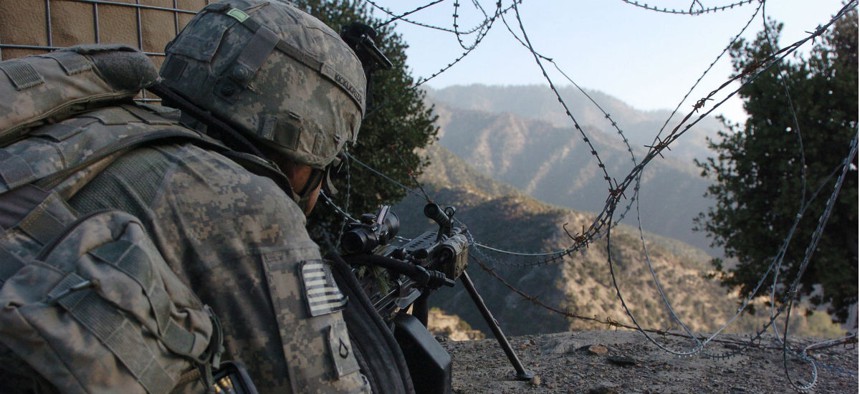
An Army soldier with Company B, 2nd Battalion, 12th Infantry Regiment, 4th Infantry Division, scans the Korengal Valley in Afghanistan. Sgt. Matthew Moeller / Defense Department file photo
1.6 Percent Pay Raise for Service Members in 2017?
President’s upcoming budget proposal reportedly will contain a slightly higher pay boost for members of the military next year.
President Obama will request a 1.6 percent pay raise for service members next year, according to a Feb. 1 report in Military Times.
The administration’s fiscal 2017 budget proposal, scheduled for release on Feb. 9, reportedly will include the pay bump, which is slightly higher than the 1.3 percent boost service members received in 2016. Still, the 1.6 percent figure is smaller than the expected 3.2 percent growth in private-sector wages. Federal civilian employees also received a 1.3 percent across-the-board pay increase for 2016.
The formula for determining service members’ annual pay increase is based on the Employment Cost Index and the growth in private-sector wages. But under the law (Title 37, Chapter 19, Section 1009) the president has the authority to set an alternate pay raise for military personnel, citing a national emergency or fiscal concerns, if Congress doesn’t pass legislation adjusting the amount or canceling it. The House wanted to give service members a 2.3 percent bump in 2016, but Congress ultimately went with the 1.3 percent figure supported by the Senate and Obama.
Service members received a 1 percent raise in 2014 and 2015, after more significant bumps in the years following the 9/11 terrorist attacks. In 2002, for instance, service members received a 6.9 percent pay raise. Between 2011 and 2013, when the across-the-board pay raise for federal civilian employees was frozen, service members received pay increases between 1.4 percent and 1.7 percent.
The White House also will propose increasing the amount military retirees pay in TRICARE fees, according to Military Times, a recommendation the administration has made in previous budgets.







